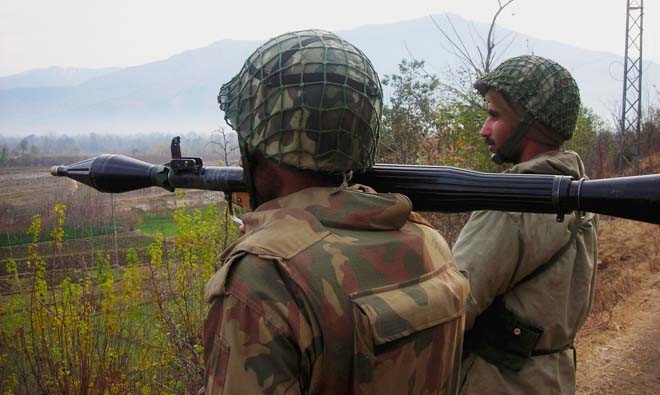

With the launch of the ground offensive in North Waziristan, it is likely the conflict will become bloodier, as the two sides will engage in a face-to-face battle.
Meanwhile, "There are many areas inside the North Waziristan Agency that have been left untouched. The focus is on particular parts of North Waziristan, and not all of it," says Sailab Mehsud, founder of the Tribal Union of Journalists, who reports for several local and international news organisations.
When asked why there is a selective operation, Mehsud refuses to comment. "There are things we cannot tell," he adds.
But others from the area, speaking on condition of anonymity, have claimed that the areas being targeted are the ones occupied by anti-state elements, and the ones where pro-Pakistan militants operate from are being spared.
However, those who have remained at the helm of tribal affairs defend this policy of selective targeting.
"We should have some of these groups on our side, which is the case and it should remain so. Foremost, Pakistan should take measures to address its internal concerns for security, especially in light of threats from neighbouring countries," says Brigadier Ghazanfar Ali, a retired military officer who has served in the tribal belt, and has been part of the ISI, during the mid-2000s.
For Brigadier Ali, the given timeline of the operation being six week long may be unrealistic. Also, he believes, the military may achieve some success - but it will not be able to secure the area completely. "The biggest issue is of the porous border. These elements can escape on the other side, and the Afghan government has not cooperated with Pakistan despite their commitment to seal the border," he adds.
This cross border movement happened at the time of Swat Operation too, in 2009, when Fazlullah, who currently heads Tehreek-e-Taliban Pakistan, escaped into Afghanistan and has been operating from there since, launching attacks in Pakistan.
But it is not only the militants that are crossing over. This time, even refugees have done the same. According to Sailab Mehsud, this is a bigger problem. "If these displaced persons are in Afghanistan, they may easily be brainwashed by anti-Pakistan forces and be used against us in the near future, especially nowadays when they are so vulnerable and feel alienated due to the mismanagement of Pakistani authorities in handling the IDP issue," he adds.
Currently, more than 400,000 families have been registered by the Pakistani authorities as they flee the offensive and head to settled parts of Pakistan. However, very few (according to some reports from the ground only two dozen families) are living at the government managed camps, due to lack of facilities in these temporary settlements.
While this Operation may bring results in the short-term, according to some analysts, in the long-term the situation may not improve if other much needed measures are not taken.
"There is an impression that terrorism in Pakistan is linked to North Waziristan, which is a false narrative woven by those who do not want the real issue to be exposed," says Saifullah Mehsud, who is the executive director at the Fata Research Center (FRC), an independent think tank, which focuses on issues in the tribal belt of Pakistan.
"The people of the tribal belt were always armed, but were never anti-state. It is the inflow of jihadi ideology from Southern Punjab and elsewhere which radicalised the population in these areas. And this ideology has been borrowed from those fighting in Kashmir. As that conflict cooled down, such elements were re-directed towards Afghanistan," adds Saifullah Mehsud.
Also, according to him, the good and bad Taliban differentiation still exists in the minds of the security establishment, and that is where the real problem lies.
"Although it’s too early to say whether or not this Operation will be against all the militants in the region, but some reports suggest that it is not. For example, Gul Bahadur and Khan Said Sajna, who are not considered a threat to Pakistani interests as they have publicly claimed, may not be targeted," says Saifullah Mehsud.
Experts believe, however, the real problem of eradicating terrorism depends on how Pakistani state defines terrorism.
"If terrorism for Pakistan means only those groups that attack security forces and civilians inside the country, then this operation may result in reduction of such attacks for some time but they may resume again. Also, since foreign militants are also being targeted, they may not head to Pakistan any more for refuge," explains Saifullah Mehsud.
But all this depends on what happens in Afghanistan in the coming days as the American forces pull-out begins and a new democratic set-up takes over the country. As of yet, the murmurs in the security establishment point to a paranoia that Afghanistan and India may collaborate against Pakistan.
The feeling of animosity towards Pakistanis is rampant in Afghanistan because they blame Pakistan for their turmoil.
"With no friends in the region, Pakistan has to rely on someone and the only people they have a working relationship with are the Taliban," says Saifullah Mehsud.
But even that policy has had its implications. As Pakistan tries to use proxies to achieve its foreign policy objectives, there is a possibility that the good Taliban of today may become the bad Taliban of tomorrow. "There is no guarantee that the ‘good’will not turn ‘bad’ in future. And that is the failure of this security policy and our intelligence agencies, which they have not learnt yet," he adds.